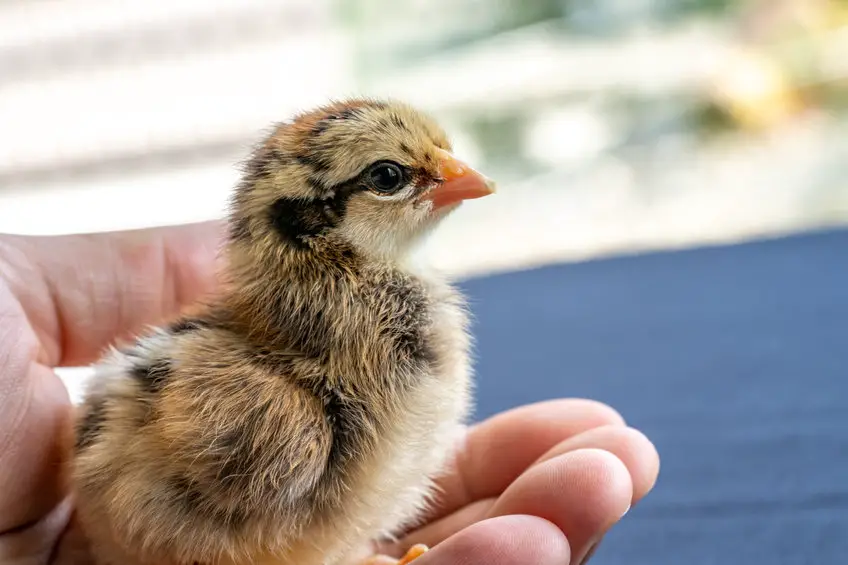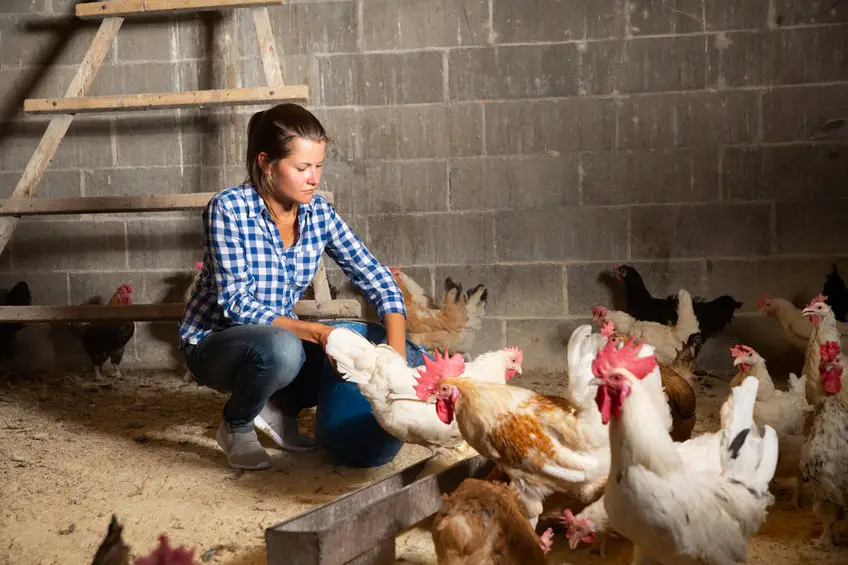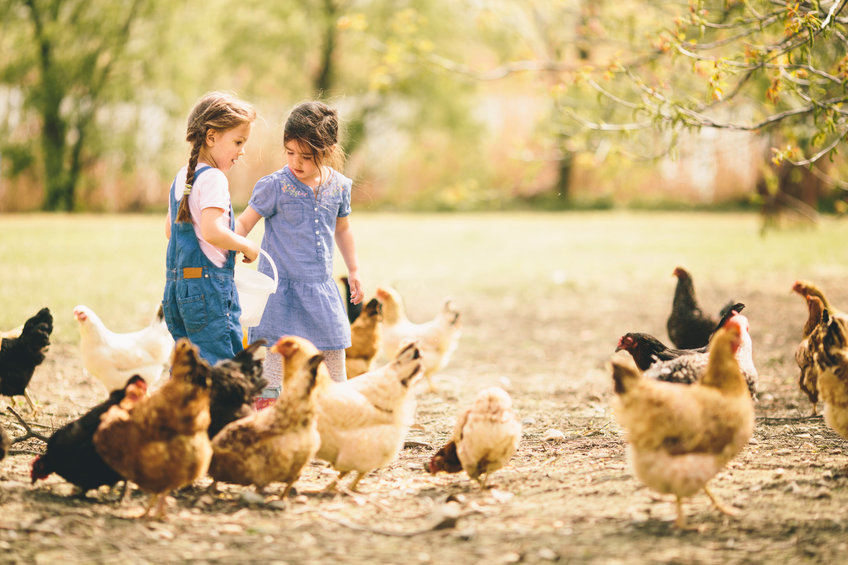If you own chickens, you probably already know it’s fun to watch their antics out in the coop or run. But have you spent enough time with your flock so they are used to you? If so, you may already know how to socialize chickens and understand the benefit of it.
Socializing your chickens may seem completely normal to some you, and completely foreign to others. Much of this will depend on how you view your chooks.
What we mean is if you see your flock in a strictly utilitarian way i.e. only for eggs and/or meat, you may not see any benefit of going through the effort to socialize your flock. That’s not necessarily a bad thing! You’ll still appreciate and take care of them but don’t feel the need to “hang out,” and let them get comfortable with you.
On the other end of the spectrum are you chicken lovers! You see your chickens as pets or even as part of the family. You’re most likely in it for the eggs or hatching chicks vs meat production. As in the other scenario, that’s okay too. You’ll care for them by providing feed and water, but will also place an emphasis on spending more time with them outside of the daily chores.
Of course, there are many of you will also fall somewhere in the middle of the two extremes.
In each of these scenarios, the chickens are getting adequate care. So really, is socializing your flock really all that necessary? Thus our discussion in this article. We believe it is helpful for many reasons. Read on the get the full scoop.
Why Socialize Chickens?
There are a few reasons to consider spending more time with your flock. It can be beneficial for both farmer and flock.
When it comes down to doing certain tasks with the hens i.e. wing clipping, tending to a sick one, treating mites, etc., the task is much easier since the hens are already comfortable.
And because of this rapport you, as the farmer, benefit from not having to chase them all over the coop or run when you just want to clip their wings. They can be really challenging to catch if they are not used to you and want to fly off,

When To Socialize Chickens?
The main rule of thumb here is the earlier the better. For many of us, this is not a problem. When you first bring the chicks home from the store, it’s fun to hold them and spend time caring for them.
If this type of routine is done consistently, you will have a tame flock. What can tend to happen, at our house anyway, is as that chicks get older the novelty wears off and we spend less time with them. Guilty.
Now we try to plan for a few minutes each day while checking their feed and water just hanging out with them. It doesn’t have to be an arduous task of find each chicken, petting it, etc. It’s just a few minutes throwing out treats, petting the ones that are already friendly, and observing them.
These may seem like minor things, but your flock is getting used to seeing you out there, and getting more comfortable with your presence.
Just how friendly your flock is also depends on the breeds you have. The more docile breeds like Buff Orpington, Wyandottes, Silkies, etc., are more apt to respond favorably to you than breeds like Leghorns or Rhode Island reds.
But there can be individual differences among each breed as well. Kinda like people, right? Although rare, we’ve had a few tame leghorns through the years. This phenomenon is not as common as with the uber sweet Buff Orpingtons, but it happens. And the reason why? We spent time with them.
Next we’ll get into the “how” to socialize your flock!
How To Socialize Your Chicken
By now, you probably already know that spending time with your flock can equate to a well-socialized group of chooks. We’ll list a few of our favorite tips on socializing our own flock, and hope it will help with yours as well.
These tips are based on our experience but seem to have proven effective over the years. We hope they help you as well!
Start When They Are Chicks
The earlier the better when it comes to getting your chickens used to you. The more they see you, get used to you handling them, and talking to them early on, the better the chances you’ll have tame, calm adult chickens.
Generally speaking many of us like interacting with our fuzzy little chicks so this is not usually a problem! The key is maintaining that contact as your chicks grow into adulthood.
Interact With Them More
Like people, the more you interact with someone, the more comfortable you are in their presence. The same goes for chickens. Just being in the coop with them while doing daily chores gets them used to seeing you there.
Talking to them gets them used to your voice. Avoid running after them or they’re bound to get scared. Instead, simply crouch down and let them approach you. If you have dogs, it’s a similar concept to that process of letting them ease into getting to know you.
As we talk about next, if you have a treat in your hand, this gesture will mean even more!
Give Them Treats
This is really our number one tip for gaining your flock’s affection. Once you start providing them with treats, you’ll have them loving you in no time!
With our flock, as soon as they hear the rustling sound of the scratch bag being opened, they come running. We never tire of watching them run at us in anticipation of their favorite snack.
You can simply scatter the treats (grubs, scratch, mealworms, veggie scraps, etc.) and watch them scramble to gobble ’em up. Or, simply hold out your hand so they’ll come and literally eat it out of your hand. Beware, on occasion, those beaks can hurt your palms a bit, but usually nothing serious.
By using treats, they’ll grow to enjoy you quickly. Whenever you need to do any chicken care related tasks, your chickens will have no fear coming up to you.
Have Family/Friends In The Coop
So they don’t just get used to you in the coop, it’s not a bad idea to have friends and/or family members in the coop as well.
This allows them to become familiar and comfortable with all people. Have others provide them treats out of their hands!

Bring in Toys
Toys entertain your flock and, in turn, your chickens entertain you! Toys can help stave off boredom, especially if they aren’t free ranging.
The best type of toys are treat oriented, like leaves, grass, sunflowers. If you take a huge sunflower head in the coop or run and hold it in your hands, they’ll pick away on it for a long time!
Another idea is to take an old 16 oz plastic pop bottle container and fill it with treats. Scratch grains work well. Then use a drill to make several 1/4 inch holes in the container. and make just large enough openings for then to pick the treats out.
Then hold the bottle in your hands while they pick away at the treats. When you leave, either leave the bottle or take it with you the next time you go in the coop or run.
For more ideas on chicken toys, read this article.
Hold Them
We believe holding your flock is okay. We’ve owned chickens for many years and haven’t gotten sick after holding them.
However, there is an article by the CDC on poultry which states you can get sick by holding your chickens if proper precautions aren’t taken! It states that the types of sicknesses can range from minor skin irritations to other conditions that can be deadly.
Obviously this is important to note! More information on the topic can be found at the CDC website. The big takeaway is to wash your hands thoroughly once you’re done handling your chickens.
We can only talk about our own experience here, and we have never gotten sick from handling our flock and are not worried about it, either. We take the precautions of washing our hands, and make sure our kids do was well. When doing coop cleaning, treating for mites etc., we wear gloves. These precautions have always worked well for us.
Okay, now that we’ve covered THAT part, we want to discuss how holding your chickens can be one of the best ways to socialize with them.
- It gets them used to you
- They will trust you
- It will make it easier to do chicken care tasks like wing clipping, checking or treating for mites, and more
The more you handle your flock, they more the tame they become, and the easier it is to work with them.
Hang Out In The Coop Or Run
Depending on how large your coop and/or run are, or how it’s set up, the run can be a relaxing place to be. Since many of us are on our phones a lot anyway, pull up a chair in the run and just hang out, check messages, text a friend, etc.
Other activities can be:
- Put technology aside, grab a book, and read for awhile
- Just be alone with the flock for a few minutes to get a break from your house chores, or your family…did I just say that? Yup I did – the coop or run can be a nice mini-break from the drama unfolding in the house, especially if you have teenagers ?. Hey life happens, right? The coop or run can be a great distraction.
If you own a small coop or run, then obviously this won’t work. But you can consider free ranging them briefly in the yard while you’re out there with them. They’ll love the time to roam a bit while you’re nearby to make sure they don’t get into trouble (i.e. pooping on the deck, digging out your flowers…you get the idea)

How Socializing Your Chickens Can Help
Socializing your flock has many benefits. We list just a few of them below:
- You’ll have an easier time working with them. It can be stressful for your flock AND you if you have to check for mites and you’re chasing them all over the run because they’re so wild. A good bond minimizes or eliminates that stress altogether.
- You’ll have a happier, calmer flock. Adding to the point above, calm chickens are happier chickens!
- You’ll enjoy your flock more. By spending more time with them, you’ll grow to appreciate their individual differences, personalities, and heading out the the coop will be less of a chore and something you actually look forward to!
Closing Thoughts
We hope we’ve provided a strong case as to the benefits of having a socialized flock. Is it extra work? Yes. It will involve being out with your brood more. Although that can be hard with our busy lives these day, the payoffs can be so worth it for both you and your brood.
You’ll have a happier flock that’s more relaxed and content. They’ll also be easier to work with. What’s not to love about that!
Thanks for stopping by and happy ‘Chickening!’


